This article needs additional citations for verification .(October 2021) |
The following is a list of social nudity organizations associated with naturism and nude recreation within a family-friendly, non-sexualized context.
This article needs additional citations for verification .(October 2021) |
The following is a list of social nudity organizations associated with naturism and nude recreation within a family-friendly, non-sexualized context.
Advocates for nude and clothing-optional recreation in North America diverge significantly from the norms of traditional "naturism" and "nudism" in the same geographical region, and therefore require their own category.

Naturism is a lifestyle of practicing non-sexual social nudity in private and in public; the word also refers to the cultural movement which advocates and defends that lifestyle. Both may alternatively be called nudism. Though the two terms are broadly interchangeable, nudism emphasizes the practice of nudity, whilst naturism highlights an attitude favoring harmony with nature and respect for the environment, into which that practice is integrated. That said, naturists come from a range of philosophical and cultural backgrounds; there is no single naturist ideology.
The International Naturist Federation (INF) or Fédération naturiste internationale (FNI) or Internationalen Naturisten Föderation (INF) is the global umbrella organisation representing official national naturist societies.

The American Association for Nude Recreation (AANR) is a naturist organization based in the United States.

Freikörperkultur (FKK) is a social and health culture that originated in the German Empire; its beginnings were historically part of the Lebensreform social movement in the late 19th century. Freikörperkultur, which translated as 'free body culture', includes both the health aspects of being naked in light, air and sun and an intention to reform life and society. It is partly identified with the culture of nudity, naturism and nudism in the sense of communal nudity of people and families in leisure time, sport and everyday life.
Gay naturism or LGBT naturism concerns a lifestyle of gay people in which nudity, especially in a communal context, is viewed as natural, positive and healthy. While naturist clubs and resorts in the United States date back to the 1930s, gay naturist organizations did not emerge until the early 1980s. Separate from official naturist clubs, gay individuals have long congregated in locally-known gay beaches in many countries, especially in Europe and North America.

Nude recreation consists of recreational activities which some people engage in while nude. Historically, the ancient Olympic Games were nude events. There remain some societies in Africa, Oceania, and South America that continue to engage in everyday public activities—including sports—without clothes, while in most of the world nude activities take place in either private spaces or separate clothing optional areas in public spaces. Occasional events, such as nude bike rides, may occur in public areas where nudity is not otherwise allowed.
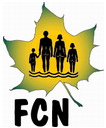
The Federation of Canadian Naturists (FCN) is the official International Naturist Federation (INF) representative for English-speaking Canada. It was founded in 1986, and has been reported to have 1,300 members.

The Fédération Québécoise de Naturisme (FQN) is the official International Naturist Federation (INF) representative for the province of Quebec and for French-speaking Canada.
The FQN–FCN Union is the official representative organization for Canada in the International Naturist Federation (INF). It was created by the French-language Fédération Québécoise de Naturisme (FQN) and the English-language Federation of Canadian Naturists (FCN) because the international body recognizes only one naturist organization per country.
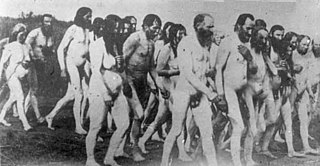
Nudity is sometimes used as a tactic during a protest to attract media and public attention to a cause, and sometimes promotion of public nudity is itself the objective of a nude protest. The practice was first documented in the 1650s with Quakers "naked as a sign" practice. Later the tactic was used by svobodniki in Canada in 1903, and photographs of their nude protests have been published. The tactic has been used by other groups later in the century, especially after the 1960s. Like public nudity in general, the cultural and legal acceptance of nudity as a tactic in protest also varies around the world. Some opponents of any public nudity claim that it is indecent, especially when it can be viewed by children; while others argue that it is a legitimate form of expression covered by the right to free speech.
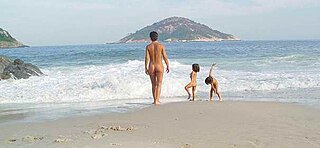
A nude beach, sometimes called a clothing-optional or free beach, is a beach where users are at liberty to be nude. Nude beaches usually have mixed bathing. Such beaches are usually on public lands, and any member of the public is allowed to use the facilities without membership in any movement or subscription to any personal belief. The use of the beach facilities is normally anonymous. Unlike a naturist resort or facility, there is normally no membership or vetting requirement for the use of a nude beach. The use of nude beach facilities is usually casual, not requiring pre-booking. Nude beaches may be official, unofficial, or illegal.
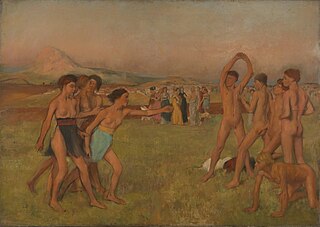
This timeline of social nudity shows the varying degrees of acceptance given to the naked human body by diverse cultures throughout history. The events listed here demonstrate how various societies have shifted between strict and lax clothing standards, how nudity has played a part in social movements and protest, and how the nude human body is accepted in the public sphere.
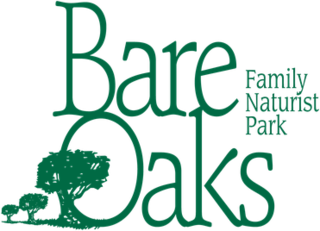
Bare Oaks Family Naturist Park is a naturist resort located in southern Ontario, about 40 kilometres (25 mi) from Toronto. It encompasses typical amenities for day users, 110 serviced campsites, five cabins, and five guest rooms. The club is situated on 50 acres (20 ha) of privately owned, forested land at the edge of the Oak Ridges Moraine, within the Ontario Greenbelt. Harrison Creek borders the northern boundary while the Black River bisects the property. There are also two ponds and a small lake.
In Canada, topfreedom has primarily been an attempt to combat the interpretation of indecency laws that considered a woman's breasts to be indecent, and therefore their exhibition in public an offence. In British Columbia, it is a historical issue dating back to the 1930s and the public protests against the materialistic lifestyle held by the radical religious sect of the Freedomites, whose pacifist beliefs led to their exodus from Russia to Canada at the end of the 19th century. The Svobodniki became famous for their public nudity: primarily for their nude marches in public and the acts of arson committed also in the nude.
Naturism is a cultural and social movement practicing, advocating and defending social nudity in private and in public. It is particularly strong in Germany where it goes under the name Freikörperkultur (FKK). It refers to a lifestyle based on personal, family and/or social nudism in the "great outdoors" environment. Naturism grew out of the German Lebensreform movement and the Wandervogel youth movement of 1896, and has been adopted in many neighbouring European countries and was taken by the German diaspora to North America and other continents.
Naturism in the United States is the practice of social nudity as a lifestyle that seeks an alternative to the majority view of American society that considers nakedness and sexuality to be taboo based upon the legacy of Puritan and Victorian attitudes. Enthusiasm for naturism began in the late 1920s with the establishment of members-only communities where naturists could gather to socialize and enjoy recreation without clothing in an environment that was no more sexual than that experienced while clothed. In later decades some groups began advocating for more general acceptance, and the opening up of public land to clothing-optional recreation.
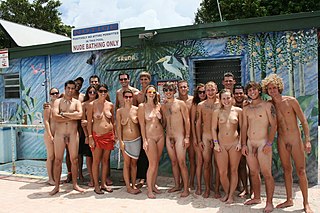
A naturist resort or nudist resort is an establishment that provides accommodation and other amenities for guests in a context where they are invited to practice naturism – that is, a lifestyle of non-sexual social nudity. A smaller, more rustic, or more basic naturist resort may be called a naturist camp.